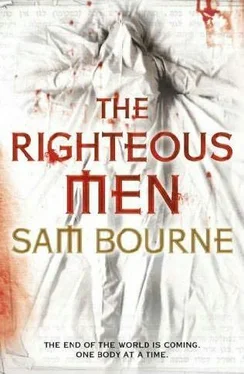Sam Bourne - The righteous men
Здесь есть возможность читать онлайн «Sam Bourne - The righteous men» — ознакомительный отрывок электронной книги совершенно бесплатно, а после прочтения отрывка купить полную версию. В некоторых случаях можно слушать аудио, скачать через торрент в формате fb2 и присутствует краткое содержание. Жанр: Триллер, на английском языке. Описание произведения, (предисловие) а так же отзывы посетителей доступны на портале библиотеки ЛибКат.
- Название:The righteous men
- Автор:
- Жанр:
- Год:неизвестен
- ISBN:нет данных
- Рейтинг книги:3 / 5. Голосов: 1
-
Избранное:Добавить в избранное
- Отзывы:
-
Ваша оценка:
- 60
- 1
- 2
- 3
- 4
- 5
The righteous men: краткое содержание, описание и аннотация
Предлагаем к чтению аннотацию, описание, краткое содержание или предисловие (зависит от того, что написал сам автор книги «The righteous men»). Если вы не нашли необходимую информацию о книге — напишите в комментариях, мы постараемся отыскать её.
The righteous men — читать онлайн ознакомительный отрывок
Ниже представлен текст книги, разбитый по страницам. Система сохранения места последней прочитанной страницы, позволяет с удобством читать онлайн бесплатно книгу «The righteous men», без необходимости каждый раз заново искать на чём Вы остановились. Поставьте закладку, и сможете в любой момент перейти на страницу, на которой закончили чтение.
Интервал:
Закладка:
Each terminal was programmed to show the same home page, the website of the Hassidic movement. There was a tracker on the left of the screen, scrolling birth announcements:
Zvi Chaim born to the Friedmans, Tova Leah to the Susskinds, Chaya Ruchi to the Slonims. At the top of the screen was a banner, showing the same face that hung on the wall, though this time it appeared to be dissolving into a picture of the Jerusalem skyline. Underneath ran the slogan: Long Live the Rebbe Melech HaMoshiach forever and ever.
Will read the line three times, as if trying to crack a cryptic crossword clue. He had no idea about melech but Moshiach was now very familiar, even if he had not seen it in this form.
The word that mattered was Rebbe. The man in the picture that hung everywhere — an ancient rabbi with a biblical white beard and a black trilby pressed firmly on his head — was their leader, their Rebbe.
To Will, it felt like a breakthrough. All he had to do was find this man and he would get some answers. A community like this, he was sure, would be hierarchical and disciplined: nothing would happen without the nod of the top man. He was like a tribal chief. If Beth had been taken by the men of Crown Heights, the Rebbe would have given the order. And he would know where she was now.
Will left hurriedly, anxious to find this Rebbe as quickly as he could. As he got back onto the street, he noticed that others were moving at similar speed; everyone seemed to be in a rush. Maybe something was going on? Maybe they had heard about the kidnapping?
Within a block or two he found what he was looking for: a place where people gathered to eat or drink. For reporters, cafes, bars and restaurants were essential locations. If you needed to talk to strangers, where else could you start? You could hardly knock on people's front doors; stopping people in the street was always a last resort. But in a cafe, you could start a conversation with almost anybody — and find out plenty.
There were no cafes here, no bars either, but Marmerstein's Glatt Kosher would do. It was more of a dining room than a restaurant. It looked like a canteen, with hot food at a counter served by large, grandmotherly women. Their customers seemed to be gaunt, pale men, wolfing down chicken schnitzel, gravy-soaked potatoes and iced tea as if they had not eaten for twenty-four hours. It reminded Will of the refectory at his public school: big women feeding thin boys.
Except this scene was much more bizarre. The men might have stepped out of a picture book of seventeenth-century eastern Europe and yet several of them were yammering away into cell phones. One was simultaneously tapping into a BlackBerry and reading the New York Post. The collision of ancient and modern was jarring.
Will queued up to get his own plate, not that he felt like eating; he just needed an excuse to be there. He hesitated over his choice of vegetable, overcooked broccoli or overcooked carrots, and was soon upbraided by one of the babushkas behind the counter.
'Hurry, I want to get home for shabbos,' she said without a smile. So that explained the rush: it was Friday afternoon and the Sabbath was coming. Tom had mentioned something about that as Will left, but he had not taken it in: he literally did not know what day it was. This was bound to be bad news. Crown Heights would surely close down in the next hour or two; no one would be around and he would find out nothing. He had no choice; he would have to move fast, starting right now.
He found what he needed: a man sitting alone. There was no time for English circumlocution. He would have to deploy the instant, American approach: Hi, how you doing, where do you come from?
His name was Sandy and he was from the West Coast. Both of which facts caught Will by surprise. He had, half-consciously, assumed that these men with their beards and black hats would bear alien names and speak with thick Russian or Polish accents.
That had been part of the culture shock of the last hour, the realization that a corner of what could have been medieval Europe lived and breathed in the here and now, in twenty first century New York. He felt like a novice swimmer who discovers he can no longer touch the bottom.
'You Jewish?'
'No, I'm not, I'm a journalist.' Ridiculous thing to say. 'I mean, the reason why I'm here is that I'm a journalist. For New York magazine.'
'Cool. You here to write about the Rebbe?' He pronounced it Rebb-ah.
'Yes. Well, among other things. You know, just writing about the community.'
Sandy turned out to be relatively new to Crown Heights.
He said he had been 'a surfer dude' on Venice Beach, 'hanging out, taking a lot of drugs'. His life had been a mess until six years ago, when he had met an emissary of the Rebbe who had established an outreach centre right on the oceanfront.
This Rabbi Gershon gave him a hot meal one Friday night and that was how it started. Sandy popped in there for the next Sabbath and the next; he stayed overnight with Gershon's family. 'You know what was best, better even than the food and the shelter?' said Sandy, with an intensity Will found awkward in a man he had just met. 'They didn't judge me.
They just said that HaShem loves every Jewish soul, and that HaShem understands why we sometimes take a roundabout path. How sometimes we get lost.'
'HaShem?'
'Sorry, that's God. HaShem literally means "the Name". In Judaism, we know the name of God, we can see it written down, but we never say it out loud.'
Will gestured for Sandy to carry on. He explained that he had put his life in the hands of the Rebbe and his followers.
He started dressing like them, eating kosher food, praying in the morning and evening, honouring the Sabbath by abstaining from all work or commerce — no shopping, no using electricity, no riding the subway — from sundown on Friday to sundown on Saturday.
'And did you do anything like that before?'
The? You gotta be kidding. Man, I didn't know what shabbos was! I ate everything that moved: lobster, crabs, cheeseburgers.
My mom didn't even know what was kosher and what was treif; 'And what does she think about, you know, this?' Will gestured at Sandy's clothes and beard.
'You know, it's kind of a process?' Upspeak, even here.
'She found the kosher thing hard; me not being able to eat with her when I visit with her in her home. And now that I have kids, that gets kind of tricky. But the toughest thing for her, without a doubt? When I became Shimon Shmuel, rather than Sandy. She couldn't get her head round that.'
'You changed your name?'
I wouldn't really call it changing my name. Every Jew has a Hebrew name already, even if he doesn't know what it is.
It's the name of our soul. So I like to say that I discovered my real name. But I use both. When I visit my mom, or when I meet, you know, someone like you, I'm Sandy. In Crown Heights, I'm Shimon Shmuel.'
'So what can you tell me about this Rebbe, then?'
'Well, he is our leader and he is a great teacher and we all love him and he loves us.'
'Do people do whatever he tells them to do?'
'It's not really like that, Tom.' (Will had had to think quickly.
In all his preparation he had forgotten to make up a pseudonym.
So he had borrowed Tom's first name and his mother's maiden name: Sandy thought he was talking to a freelance reporter called Tom Mitchell.) 'The Rebbe just knows what's right for all of us. He's like the shepherd and we're his flock.
He knows what we need, where we should live, who we should marry. So, yes, we listen to his advice.' Will's hunch was being confirmed. This guy pulled every lever.
'And where does he live?'
'He is right here in this community, every day.'
'And can I meet him?'
'You should come to shul tonight.'
Читать дальшеИнтервал:
Закладка:
Похожие книги на «The righteous men»
Представляем Вашему вниманию похожие книги на «The righteous men» списком для выбора. Мы отобрали схожую по названию и смыслу литературу в надежде предоставить читателям больше вариантов отыскать новые, интересные, ещё непрочитанные произведения.
Обсуждение, отзывы о книге «The righteous men» и просто собственные мнения читателей. Оставьте ваши комментарии, напишите, что Вы думаете о произведении, его смысле или главных героях. Укажите что конкретно понравилось, а что нет, и почему Вы так считаете.












